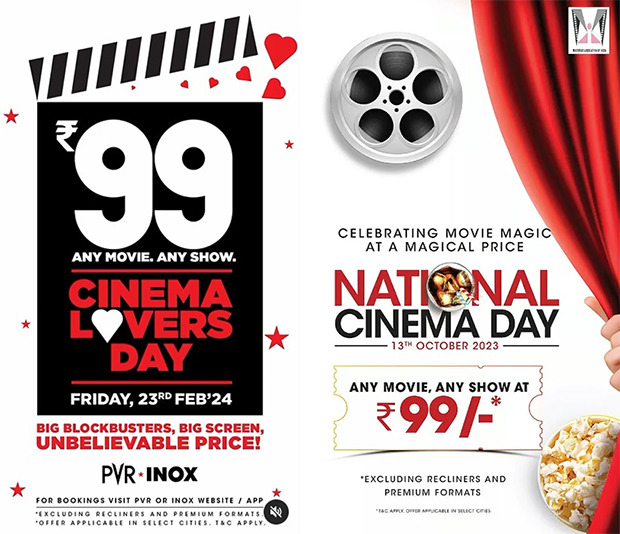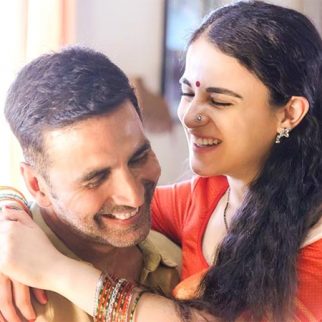Last year, after a dull May for Bollywood, Zara Hatke Zara Bachke was all set to release in the cinemas. The songs and the casting of Vicky Kaushal and Sara Ali Khan and the music caught attention. Yet, with many films before not doing well, there was an apprehension that this family entertainer might also suffer at the box office. Two days before release, the makers announced that viewers could get one ticket free on every ticket. The offer grabbed eyeballs. Though it was limited to a certain number of tickets, it gave a boost to the film.

The result: Zara Hatke Zara Bachke opened at Rs. 5.49 crores, much more than expectations. The offer continued for three more days and even after that, the audience came in to watch the film. The model was hailed as a success and it was repeated for several other films released by the same distributor like Ghoomer, Dream Girl 2, The Vaccine War, Teri Baaton Mein Uljha Jiya, Sajini Shinde Ka Viral Video, Merry Christmas etc. Some other distributors also tried to do it for a few of their films like Yaariyan 2, Mission Raniganj, Dono etc.
Since then, many from the industry, trade and even exhibitors have warned that the Buy-One-Get-One (BOGO) offer is harmful in the long run. They fear that the viewers will get used to it and will wait for the scheme to be implemented. In the process, they might skip watching the film and hence, the producer will lose the potential audience.
Also, some have apprehensions about BOGO because it’s the producer who has to bear the cost of the free ticket. In most cases, the producer compensates for the free ticket sold to the multiplex. For instance, if a moviegoer buys a ticket at Rs. 112 [Rs. 100 as ticket price and Rs. 12 as GST] using the BOGO offer, he gets another ticket free at the same price. The producer gets 52% share from the bought ticket, that is Rs. 52. But in case of free ticket, the producer has to pay not just GST of Rs. 12, but also forgo the share that he’s entitled to get, that is, Rs. 52 and also pay Rs. 48 to the exhibitor. In other words, to earn Rs. 52 on a ticket, he has to spend Rs. 60 (Rs. 48 to compensate the exhibitor + GST of Rs. 12) on the free ticket which makes it a net negative return. In simple terms, the cost of a free ticket is borne by the producers in the case of BOGO.
But not all arrangements entail the producer compensating for the free ticket. In rare cases, the makers only pay the GST on the free ticket. The multiplex agrees to forgo the remaining share as viewers buy snacks inside the multiplex and hence add to their F&B revenue. Some duty managers have remarked that consumers tend to buy a bigger tub of popcorn since they have saved money on one ticket. Then in a few instances, producers assure theatres that a certain amount of tickets will be sold under BOGO. In cast the desired number is not reached, the makers compensate for the difference.
In all cases, it’s a win-win situation for the theatres as they don’t make any losses in this model. Hence, they are always more than happy if BOGO gets implemented. But in all instances of this offer, the producer or the studio ends up losing some money in the form of GST or their own share of the free ticket. In normal cases, if a film earns Rs. 100 crores at the domestic office, the producer will get around Rs. 45 crores after deducting the exhibitor share. With BOGO, the figure might reduce to Rs. 40 or even Rs. 35 crores, depending on the extent of the offer.
Yet, why does this offer find takers? One of the chief reasons is that the producer wants to show a higher earning for his film so that he/she can get a better deal with the streaming partner. That’s the nature of the game – the deal is locked as per the theatrical business. The higher the business, the more is the money offered. Secondly, the producer feels that when more people watch their film through the offer, the spread of word of mouth will be extensive. Thus, more moviegoers will turn up to watch the film, even when the BOGO offer expires. This has been in the case of Zara Hatke Zara Bachke or Teri Baaton Mein Uljha Jiya. What worked in both films was the positive word of mouth and hence, this offer made sense.
But there were films where the reports were negative or the public was just not interested. In such cases, the offer barely helped.
Nevertheless, BOGO is here to stay. Knowing that it’s not going to go away, some people in the industry have advocated that it should be implemented judiciously and usually when the film is on its last legs in cinemas. Producer Siddharth Roy Kapur endorses this arrangement; in an exclusive interview with Bollywood Hungama, he highlighted how this can help, “If you do it at that point in time (in the later weeks), then you bring in the audience who might have otherwise not watched your film in the cinemas.”

The makers of Shah Rukh Khan-starrer Jawan, for instance, offered free tickets in its fourth week. By then, the film had earned maximum revenue. Gadar 2 makers also went for BOGO during Raksha Bandhan when the film was in its third week and was already a certified blockbuster.
Rs. 99 tickets offer – another harmful tactic?
Recently, Cinema Lovers Day was celebrated with a lot of pomp when theatres offered tickets for just Rs. 99. As expected, several shows across the country were full house, even for those films that were not enticing enough. Yet, a section of the film industry is worried because the offer of cheap tickets is no longer an annual affair. It now takes place twice or thrice; the frequency might increase.
It all began with National Cinema Day, which was celebrated on September 23, 2022, when tickets were sold for just Rs. 75. This offer was given by theatres in many countries and in India, it was repeated on October 13, 2023. But in between, it was celebrated one more time, on January 20, 2023.
Yet again, the theatres are only happy as they saw huge sales of popcorn and cola. But the industry fears that the moviegoers will get used to BOGO and Rs. 99 ticket offer. What if they don’t turn up in huge numbers in the absence of such offers? What if the moviegoers decide to wait for such schemes and then skip watching the film altogether? These questions are already plaguing the industry.
If one observes, the reason such offers are attractive is because the ticket rates in theatres are quite expensive. A family of four ends up spending more than Rs. 1000 or even Rs. 2000 on tickets, snacks and parking. Hence, it’s not a surprise that the collections of certain films are terrible as the moviegoer just doesn’t want to spend a bomb on a film that he/she is not sure about.
Compare this to the scenario 20-30 years ago. In fact, the complaint that ‘watching a film in theatre is expensive’ never existed until the mid-2000s as the ticket prices were always within the reach of the common man. If someone was facing a financial crunch, he/she always had the option of buying cheaper tickets for the Upper Stall or Lower Stall than the Balcony. As a veteran in the industry pointed out to us while researching for this article, “During those days, every day was Cinema Lovers Day!”
This is the reason why such offers or even BOGO for that matter never existed because it was not needed. Audiences always came in, even for bad films, since the prices didn’t pinch them. Hence, the solution might be to have a price reduction on film tickets or at least the snacks in the theatre. Such a move can bring in audiences around the year for all kinds of films.
However, industry heavyweights might fear that lower ticket prices might also lead to lesser revenue. Then, the only solution is to make films that compel the audience to book their tickets immediately. When the urgency is there for a movie, the audience doesn’t care about ticket prices. We saw that happening with films like Oppenheimer, when tickets were sold for as high as Rs. 2,450 and yet, people were ready to pay the inflated amount. Sadly, quality check has been a major bane for our industry and until it’s not corrected, the industry will continue to rely on offers like BOGO.
More Pages: Teri Baaton Mein Aisa Uljha Jiya Box Office Collection , Teri Baaton Mein Aisa Uljha Jiya Movie Review
BOLLYWOOD NEWS - LIVE UPDATES
Catch us for latest Bollywood News, New Bollywood Movies update, Box office collection, New Movies Release , Bollywood News Hindi, Entertainment News, Bollywood Live News Today & Upcoming Movies 2024 and stay updated with latest hindi movies only on Bollywood Hungama.






